Contents
Cherry Nord Star, or Star of the North, is a popular hybrid of American selection. It was bred in 1950 by an unknown breeder in Minnesota through interspecific crosses. The parents of the variety are the Western European cherry variety Lotovaya and a seedling grown from a cherry stone of a tree of unknown origin.
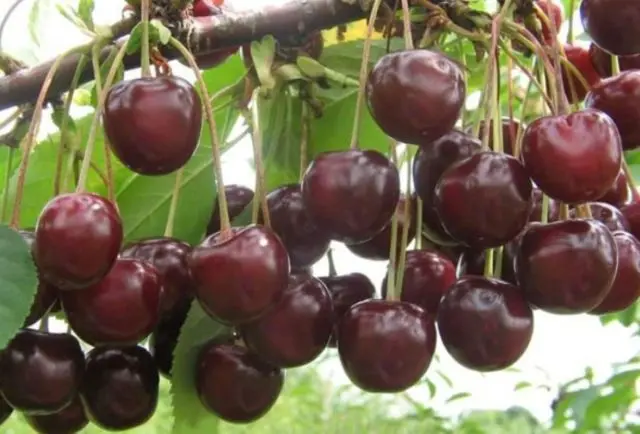
Description of Nord Star cherries
Cherry Nord Star is a short, compact tree. The crown is quite dense and wide, rounded. The color of the bark of the trunk and branches is dark brown. The leaves are narrowly oval, small, shiny. The Nord Star cherry variety is adapted for cultivation in the southern latitudes and central Our Country.
Height and dimensions of an adult tree
The maximum active growth of the tree is observed at a young age. From the moment it enters the fruiting stage, it becomes moderate. The height of the Nord Star cherry at the age of ten is 2 m.
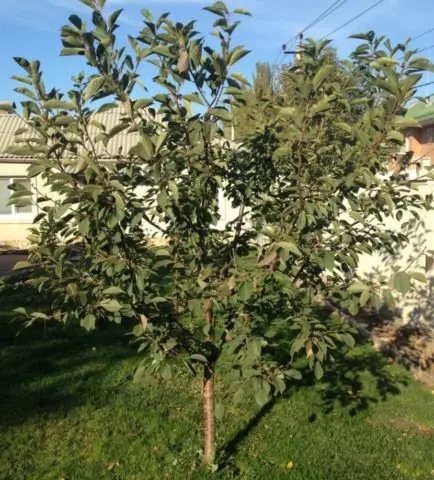
Young tree Nord Star
Description of fruits
The main characteristics of the fruits of the Nord Star cherry variety:
- weight of berries – 4-4,5 g;
- shape – round or wide-round;
- the skin is thin, shiny;
- color – dark red;
- pulp – reddish, delicate texture, fibrous, juicy;
- taste – sweetish-sour, more sour;
- the bone is round, of medium size.
The tasting score of cherries is 3,8-4 points. Separation from the stalk is dry. The pulp is easily separated from the stone. When ripe, the berries do not crumble, they are not baked in the sun. The density of fruits is low, so they do not differ in good keeping quality and transportability.
Cherry Pollinators Nord Star
Cherry Nord Star (Star of the North) is a partially self-fertile variety, so the highest productivity is observed in collective plantings. Such cherries as Oblachinskaya, Nefris, Meteor are ideal as pollinators. According to the timing of flowering, the tree belongs to the medium flowering. Flowering begins in May.
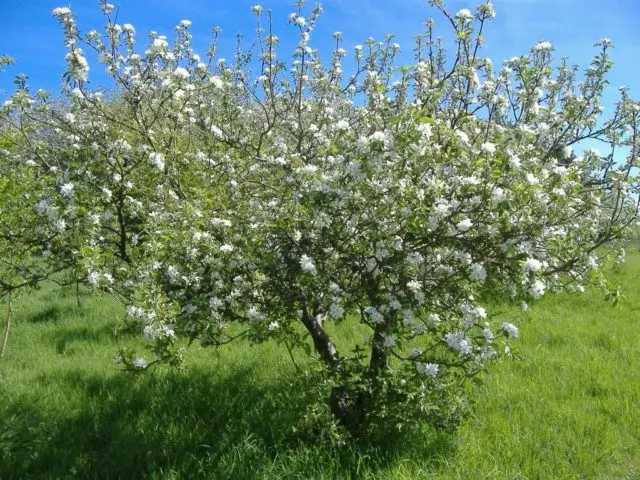
Spring cherry blossom looks very beautiful
The main characteristics of Nord Star cherries
To get to know Nord Star cherries in detail, it is necessary to study the main distinguishing characteristics of the tree and the taste of the fruit.
Drought resistance, frost resistance
The variety is drought-resistant, so it easily endures long sultry heat in summer. Differs in high frost resistance. Belongs to the 5th zone of winter hardiness, withstands frosts up to 32-40 ° C.
Productivity
The fruiting period of grafted trees begins 2-3 years after planting. Maximum fertility is observed from 4-5 years of age. The highest yields are possible when growing trees in joint plantings with other cherry varieties. The average yield is 15-25 kg from 1 adult tree.
The variety is considered late ripening. Berries begin to ripen in July-August. The fruiting nature of the Nord Star cherry is mixed. The formation of the main crop occurs on 1-3-year-old branches. Fruits of universal purpose – suitable for fresh consumption and for processing. But most often they are processed – they preserve compotes, jams, make dried fruits. Also, the fruits, flowers and leaves of the Nord Star cherry can be used in folk medicine.
Advantages and disadvantages
Like other varieties of cherries, Nord Star has certain advantages and disadvantages.
Benefits of the North Star:
- high dessert qualities of fruits;
- small tree size
- precociousness;
- high and stable yields;
- suitability for dense planting (the distance between trees can be 2 m);
- high degree of self-fertility;
- drought tolerance;
- winter hardiness;
- not afraid of return frosts due to late flowering;
- immunity to clasterosporiasis and coccomycosis.
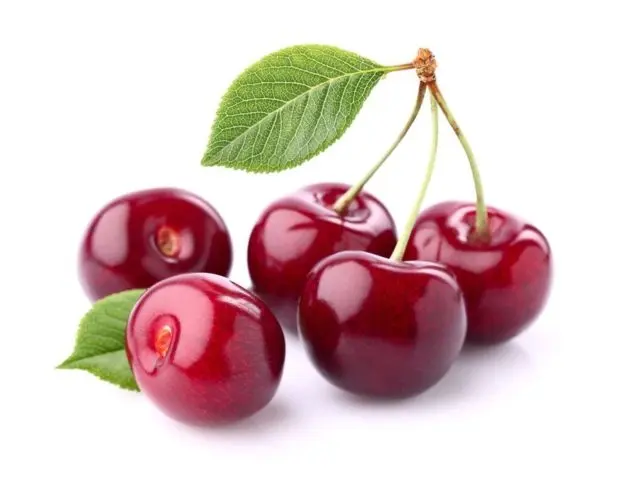
Ripe fruits are easily separated from the stalk, separation is dry
Disadvantages of the variety:
- increased acidity of fruits;
- susceptibility to moniliosis.
Rules of landing
In general, the process of planting Nord Star cherries does not have its own characteristics and practically does not differ from other varieties of cherries. The main thing is to choose the right place for planting a tree, taking into account its varietal characteristics.
Recommended dates
Nord Star cherry seedlings can be rooted both in spring and autumn. The timing will depend on the climatic features of the region. In temperate climates, the optimal planting time will be mid-April. In autumn, planting seedlings in such regions is extremely undesirable, as there is a threat of their freezing in winter.
In southern latitudes, on the contrary, planting in the fall is quite possible, the main thing is to spend it a month before the onset of the first frost. The most optimal period will be mid-October.
Site selection and soil preparation
Cherry variety Nord Star prefers sunny areas. The variety is not afraid of drought, drafts and strong winds. But at the same time, he does not like the close occurrence of groundwater. There are no special requirements for the composition of the soil, the main thing is that it be fertile and well-moistened. Before planting, it should be well prepared. It is necessary to remove all weeds on the site, especially perennials.
How to plant
Seedlings are placed on the area according to the following scheme: 2 × 3 m. When growing Nord Star cherries on an industrial scale, one should adhere to the 3 × 4 m scheme. Such placement will significantly improve the light regime.
Features of care
Cherry Nord Star is an unpretentious variety. When caring for it, the standard agricultural practices for this horticultural crop are used. Important for the rooting of young trees in a new place are the first 3-4 weeks after planting, which are considered starting. Regular watering, fertilizing and pruning during this period directly affect the survival rate of seedlings and their further development.
Watering and fertilizing schedule
Severnaya Zvezda cherry easily tolerates prolonged drought, but it is preferable to avoid moisture deficiency.
Dry season watering schedule:
- After landing.
- At the beginning of the formation of the ovary.
- 14-21 days before berries ripen.
Advice! When watering, it is necessary to ensure that moisture penetrates deep into the soil by at least 30-40 cm. You should not water the trees during the rainy period, as stagnant moisture can be detrimental to them.
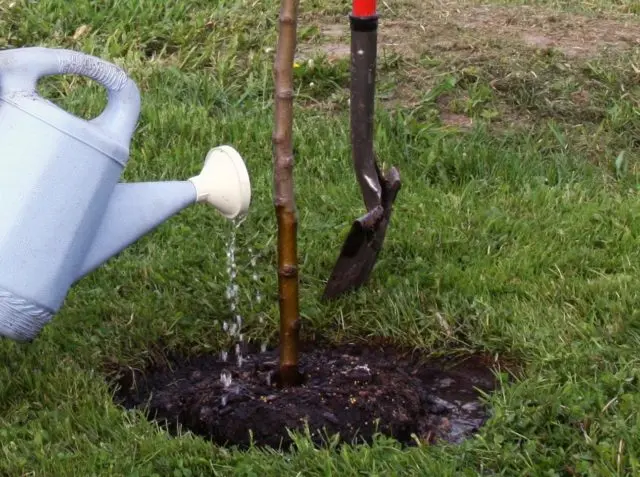
Watering a young tree is required
In the first year after planting, the seedling does not need top dressing. The tree receives all the nutrients it needs from the soil used when planting. It is recommended to make the first fertilizers from the second year of life, from the moment the soil is depleted. The frequency and abundance of dressings should increase during the period when the cherry enters the fruiting stage.
Trimming
Crown formation is one of the most important cherry care activities. Pruning old branches and removing dry ones promotes tree growth and increases yield. Pruning a young tree is necessary annually, in the spring before bud break. The cut point must be treated with garden pitch. On average, the process of crown formation lasts 5 years.
The first pruning of the tree is carried out in the year of planting. The 6 strongest branches are left on the cherry, the rest are eliminated. It is important to regularly remove root shoots, infected and unproductive branches.
Preparation for winter
It is recommended to start the main pre-winter preparation at the end of October. The branches of the tree are pressed against the trunk and wrapped with straw, tops or burlap. You can protect the root system from winter frosts with the help of snow. To do this, a small snowdrift is made around the trunk.
Young seedlings need to be more carefully insulated, as it is much more difficult for them to endure winter frosts. Therefore, in the first year after planting, in addition to the main shelter, the trunk circle is also mulched with peat or sawdust.
Diseases and pests
During the flowering period, Nord Star cherries are highly susceptible to infection with moniliosis. The threat increases especially during long and heavy rains. Fungal disease provokes the death of individual branches and generally weakens the tree.
As a preventive measure, it is necessary to regularly inspect trees for the detection of infected branches and leaves. In this case, the damaged parts of the tree are removed and treated with antibacterial drugs.
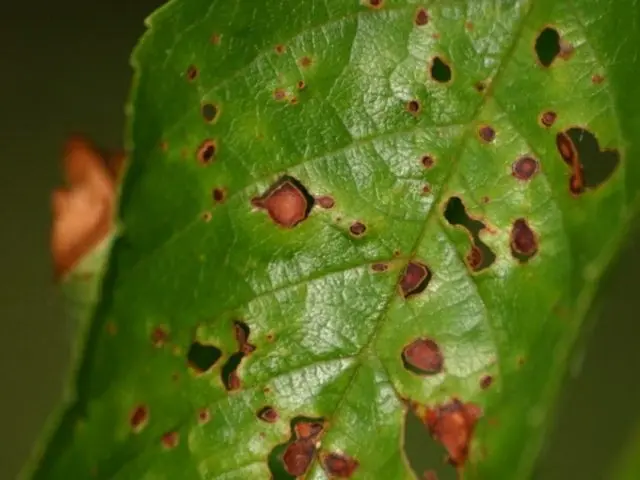
The appearance of spots on the leaves is the first sign of a tree disease.
Conclusion
Cherry Nord Star – a variety that has long chosen orchards. It is distinguished by high productivity, undemanding care and good adaptability to adverse climatic conditions. Gardeners who have opted for this variety should familiarize themselves with the recommendations of specialists in order to get an annual stable harvest without any hassle.









